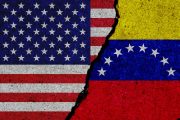Secretary of State Hillary Rodham Clinton, speaking at a town hall meeting at the University of Nairobi, Kenya, on August 6, said it was "a great regret but it is a fact" that the United States is not a member of the International Criminal Court (ICC).
"But we have supported the court and continue to do so," Clinton said, adding: "I think we could have worked out some of the challenges that are raised concerning our membership by our own government, but that has not yet come to pass." The "we" that Clinton mentioned presumably includes former President Bill Clinton, who signed the treaty establishing the International Criminal Court in December 2000. However, President Clinton never submitted the ICC treaty to the Senate for ratification.
The ICC was set up in 2002 as the world’s first permanent war-crimes court, and claims the authority to try individuals for war crimes, crimes against humanity, and genocide. The court, which began operations on July 1, 2003, only has jurisdiction within the 110 countries that have ratified its treaty, though it claims jurisdiction over individuals whose governments have not ratified the ICC treaty if they are charged with crimes committed in ratifying countries. The United States, Russia, China, and Israel have not ratified it.
A Washington Post report noted that "the Pentagon has long worried that the international war crimes court could unfairly target American military personnel stationed around the globe," a concern that has been voiced by many others who have studied the ICC documents.
During her talk, Secretary Clinton did more than express regret that the United States has not formally ratified the agreement, however. She brandished the ICC as a club to dictate to Kenyans — presumably citizens of a sovereign state — how they should run their own criminal justice system. "I have urged that the Kenyan government find the way forward themselves," she said, "But if not, then the names turned over to the I.C.C. will be opened, and an investigation will begin."
The New York Times reported that Clinton was referring to a list of suspects that former UN Secretary General Kofi Annan handed to the International Criminal Court in a sealed envelope in July. The ICC, itself, recently threatened to intervene if Kenya’s leaders decide to continue what the Times described as "the country’s stubborn history of impunity." (Note: The United Nations Commission on Human Rights has actually issued a document entitled, "Updated Set of principles for the protection and promotion of human rights through action to combat impunity.")
Mrs. Clinton said she was carrying a message directly from President Obama, whom she described as "the son of Kenya" before continuing: "If there’s not going to be a special local tribunal that has the confidence of the people, then the people deserve to know that there is some process to hold people accountable."
This treaty that is be wielded like a weapon by Secretary Clinton should worry both Kenyans and Americans.
Warnings against the threat to U.S. sovereignty that would result from our nation’s ratification of the ICC have been numerous and well researched. In the May 1998 issue of Commentary, former Justice Department officials Lee A. Casey and David B. Rivkin, Jr. outlined a very compelling case against the court: "In the name of international law," wrote the Washington, D.C.-based jurists, "the treaty will undermine our own system of justice. In the name of bringing aggressors to account, it will diminish our own ability to do exactly that, while augmenting the possibility that we or one of our close allies will sooner or later find ourselves in the dock."
An AP dispatch in the May 6, 2002 New York Times reported that Pierre-Richard Prosper, the State Department’s ambassador-at-large for war-crimes issues, announced to the press that the United States regarded the ICC treaty as "a flawed document. This is formal notification that we do not want to have anything to do with it."
And in a November 14, 2002, speech to the Federalist Society, U.S. Under Secretary of State John Bolton explained that although the Bush administration opposed the ICC in its then-present form, it supported "ad hoc tribunals … overseen by the UN Security Council [and] under a UN Charter to which virtually all nations have agreed."
"Our principal concern [about the ICC] is for our country’s top civilian and military leaders, those responsible for our defense and foreign policy," explained Bolton. "A fair reading of the [ICC] treaty leaves one unable to answer with confidence whether the United States would now be accused of war crimes for legitimate but controversial uses of force to protect world peace…. No U.S. presidents or their advisers could be assured that they would be unequivocally safe from politicized charges of criminal liability." The ICC, complained Bolton, is "part of an agenda to restrain American discretion."
One of the more disturbing provisions in the ICC treaty is its citation of the undefined crime of "aggression." Since the treaty’s authors couldn’t agree on a definition, they decided, incredibly, to write a blank check. The treaty says, in Article 5, Section 2: "The Court shall exercise jurisdiction over the crime of aggression once a provision is adopted in accordance with Articles 121 and 123 defining the crime and setting out the conditions under which the Court shall exercise jurisdiction with respect to this crime."
In other words, the court will define at a later date exactly what the crime is. This takes ex post facto law (against which Americans are protected by Section 9 of our Constitution) to a new level!
Secretary Clinton’s statement to Kenyans is a perfect example of the sovereignty-threatening nature of the ICC: "I have urged that the Kenyan government find the way forward themselves, but if not, then the names turned over to the I.C.C. will be opened, and an investigation will begin." In other words, do what the ICC tells you to do, or the ICC will do it for you. The fact that many other nations do not enjoy the protections enjoyed by Americans as a result of our Constitution does not alter the fact that U.S. ratification of the ICC treaty would eliminate those guarantees. Forced uniformity always tends to reduce all participants in a compact to the lowest common denominator. Instead of putting pressure on other nations to submit to the ICC, why not encourage (not force) them to model their form of government after our own constitutional republic, which has provided more freedom for more people than any other government in the history of the world?
Needless to say, our senators should be warned to reject the ICC, should it come up for ratification.
Photo: AP Images




